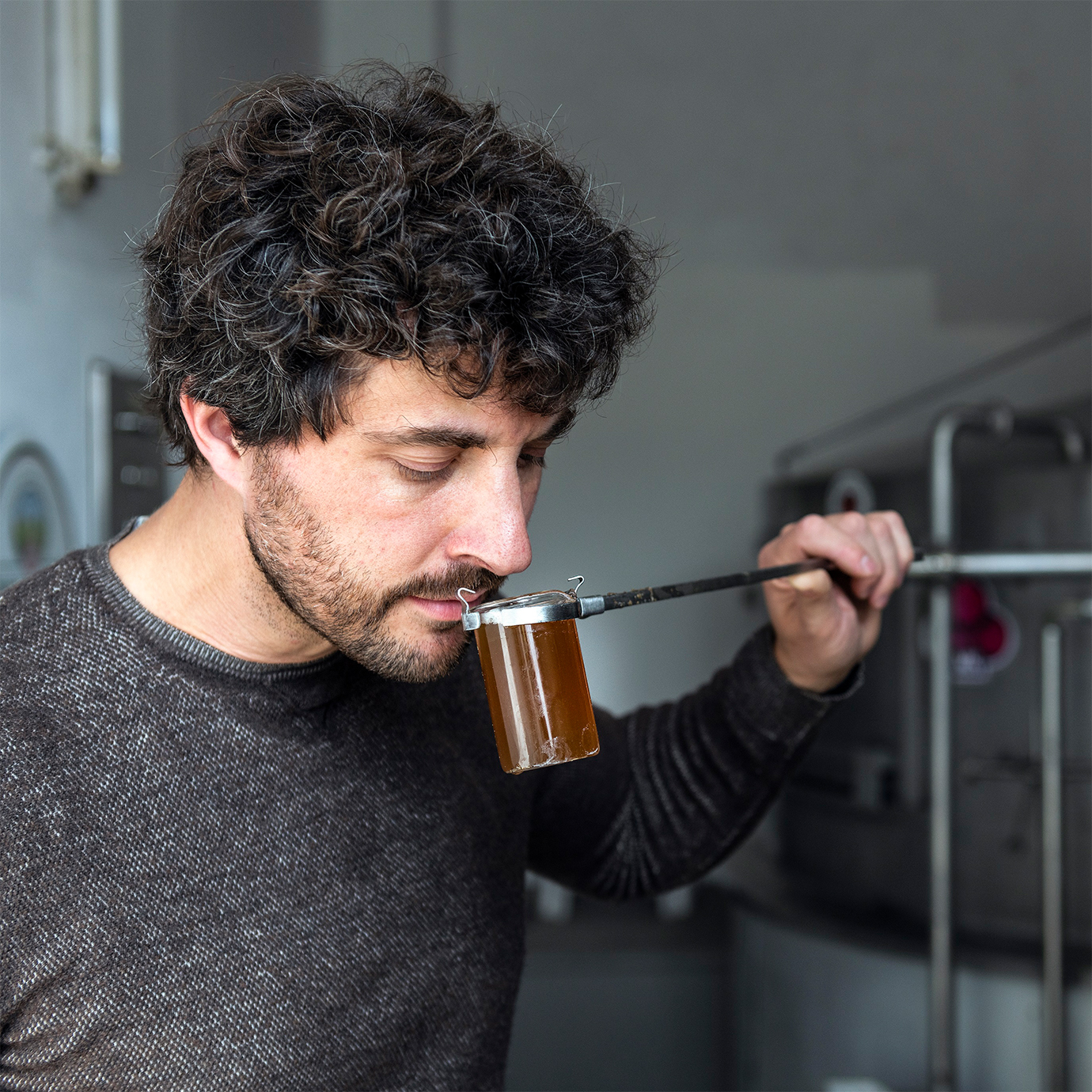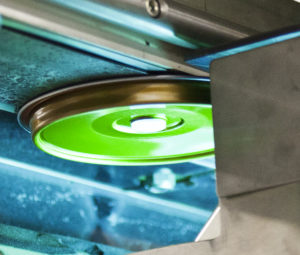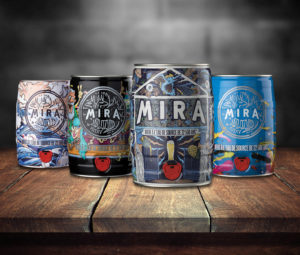According to a study by the BZgA from 2022, alcohol consumption among young people under 25 is at its lowest level ever. Only 32% of respondents stated that they consume alcohol. Breweries are also feeling this downward trend. For years, the sales of traditional beers have been declining, even though new target groups, such as women, also enjoy drinking beer. Non-alcoholic organic beer as a market opportunity can be a real game-changer for breweries.
Market opportunity: New target groups also like non-alcoholic organic beer
There are indeed new target groups that can be won as potential consumers. The Riedenburger Brauhaus has once again managed to increase its sales with a balanced product selection, innovative creations, and an understanding of the organic market. “The consumption behavior of German beer drinkers has changed significantly in recent years. Previously, non-alcoholic beer was often seen as a compromise for drivers, but today it is a product associated with a conscious dietary lifestyle. We are responding to this trend by continuously expanding our range of non-alcoholic products,” argues CEO Maximilian Krieger.
Riedenburger Brewery is the first 100% organic brewery in Bavaria
The success story of the “organic brewery” in Riedenburg, however, begins out of necessity. Since 1756, the Krieger family has been brewing beer in Riedenburg. From 1960, the brewery’s bestseller has been wheat beer. However, in the early 1980s, the economic situation for small and medium-sized breweries became increasingly difficult due to brewery industrialization and strong mono-brands. Michael Krieger, however, had a vision and, together with his wife Martha, developed a business concept that was meant to secure the future of the operation: the conversion to today’s eco-operation. Thus, the first organic beers in bottles and kegs were already being produced in 1992, and just two years later, the entire range was converted to organic. Meanwhile, the experiment of non-alcoholic organic beer as a market opportunity has more than succeeded.
Consistently organic and regional: Everything works out in Riedenburg
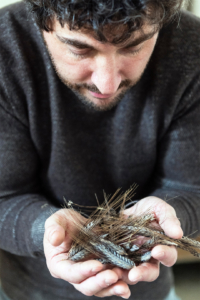 “The reasons for the switch to organic were diverse, but the ecological mindset was always paramount. My parents wanted to brew beer again, just as our ancestors did: without cultivated grain varieties, without filtration, and without hop extract. The key was the ecological raw materials,” explains Krieger. This philosophy paid off, as today they manage to serve a diverse clientele. “Our target audience is actually very diverse. There are the wheat beer fans who have been drinking our Riedenburger wheat beer before the switch to organic and have remained loyal to this day. Then there are those who like to experiment and are open to exotic varieties such as Emmer, Einkorn, and spelt beer. With our hoppy craft beers, we primarily appeal to a younger audience.” And an extensive range of non-alcoholic products is also produced. Overall, more effort is put into the production of non-alcoholic beer than compared to traditional beers with alcohol, explains Krieger. The advantage at Riedenburg, however, is that the alcohol never enters the beer in the first place, so it does not need to be removed elaborately. “We work with a reduced malt content and ferment the beer only very briefly so that no alcohol develops. This is called arrested fermentation.”
“The reasons for the switch to organic were diverse, but the ecological mindset was always paramount. My parents wanted to brew beer again, just as our ancestors did: without cultivated grain varieties, without filtration, and without hop extract. The key was the ecological raw materials,” explains Krieger. This philosophy paid off, as today they manage to serve a diverse clientele. “Our target audience is actually very diverse. There are the wheat beer fans who have been drinking our Riedenburger wheat beer before the switch to organic and have remained loyal to this day. Then there are those who like to experiment and are open to exotic varieties such as Emmer, Einkorn, and spelt beer. With our hoppy craft beers, we primarily appeal to a younger audience.” And an extensive range of non-alcoholic products is also produced. Overall, more effort is put into the production of non-alcoholic beer than compared to traditional beers with alcohol, explains Krieger. The advantage at Riedenburg, however, is that the alcohol never enters the beer in the first place, so it does not need to be removed elaborately. “We work with a reduced malt content and ferment the beer only very briefly so that no alcohol develops. This is called arrested fermentation.”
Non-alcoholic organic beer as a market opportunity with focus on quality, variety and enjoyment
“For us, beer is not just a simple consumer good, but a beverage with countless facets. That’s exactly what we want to show with our variety of styles,” explains Maximilian Krieger. Especially the non-alcoholic beers of the Bavarian organic brewery are on a growth trajectory, with an increase of nine percent. And the beer-mixed drink Riedenburger Natur-Radler Non-Alcoholic expands the non-alcoholic range to eight varieties. The Riedenburger Non-Alcoholic (0.33l), successfully introduced last year, is now widely available in national organic stores. With an ancient spelt beer and a non-alcoholic IPA, they also add a unique flavor profile to their lineup.
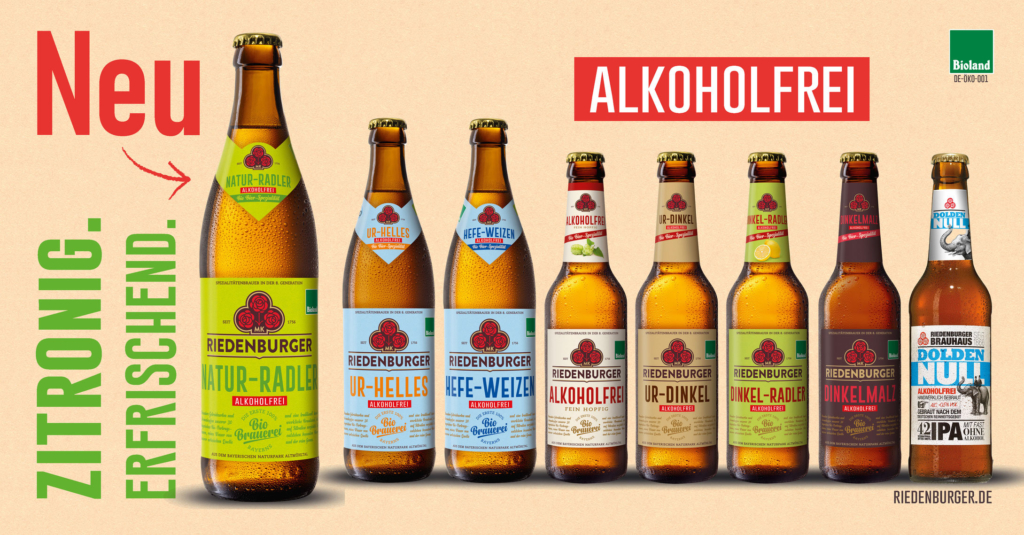
Organic out of belief and as a challenge: the Bioland seal across the entire range
“We don’t do ‘a little bit of organic,’ because for us, organic is not a marketing concept to satisfy demand for individual organic products. For us, it’s a way of life and a deep conviction. The transition phase 30 years ago was very difficult for us, but despite all the challenges, we stuck to our beliefs. This makes us credible and builds trust,” says Krieger. At Riedenburger Brewery, every single product is certified with the Bioland seal. All pre-packaged organic foods from the EU that meet the strict standards of EU regulations for organic farming must be labeled with the EU organic logo. However, they wanted to go a step further and consciously submit to stricter regulations regarding nature conservation. “With Bioland, we have found a partner who shares our philosophy: working in harmony with nature, promoting biodiversity, and actively protecting the climate and environment ensure our livelihoods and preserve a diverse cultural landscape,” explains Krieger. He admits that this strict organic stance was not always easy. “After the organic conversion in 1994, it was difficult to find organic farmers. That has changed over the years, and we have built a strong network of farmers who exclusively grow in the region.”
New sales opportunities outside the traditional beverage market
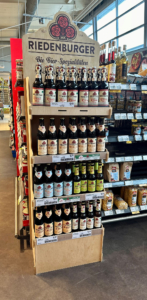 A major advantage of the exceptional products and sustainable positioning of the company is the opportunity for additional distribution channels and thus reaching new consumers. Riedenburger Brewery has indeed made a name for itself as a sustainable organic company with regional suppliers in the industry and is therefore widely listed in organic specialty stores. But the brewery also has a strong presence in traditional supermarkets. The retail chain REWE prominently showcases the products from Lower Bavaria in its regional selection, even in a high-quality wooden display. This makes it easy for all parties involved to offer the organic beer specialties to customers. “We maintain close and long-term partnerships with the responsible individuals in the markets and are thus in active exchange regarding promotions and displays. For our customers, we want to make our range of beers as easily accessible as possible. We achieve this by placing our beers outside of the traditional organic or beverage markets.” The brewery itself operates its own online shop, where customers can easily have their desired beer or a selection of beer specialties delivered to their homes via DHL.
A major advantage of the exceptional products and sustainable positioning of the company is the opportunity for additional distribution channels and thus reaching new consumers. Riedenburger Brewery has indeed made a name for itself as a sustainable organic company with regional suppliers in the industry and is therefore widely listed in organic specialty stores. But the brewery also has a strong presence in traditional supermarkets. The retail chain REWE prominently showcases the products from Lower Bavaria in its regional selection, even in a high-quality wooden display. This makes it easy for all parties involved to offer the organic beer specialties to customers. “We maintain close and long-term partnerships with the responsible individuals in the markets and are thus in active exchange regarding promotions and displays. For our customers, we want to make our range of beers as easily accessible as possible. We achieve this by placing our beers outside of the traditional organic or beverage markets.” The brewery itself operates its own online shop, where customers can easily have their desired beer or a selection of beer specialties delivered to their homes via DHL.
Climate protection and beer: Moving away from fossil fuels one step at a time
The organic conversion in 1994 and the construction of the new filling facility in 2014 have significantly contributed to the success of the brewery, according to the company. Now, the construction of a new brewhouse, fermentation and storage cellar, as well as energy supply, is on the agenda. The main focus will be on the use of regenerative energy and a visitor-friendly overall concept. “This new construction project is the most complex undertaking in the history of Riedenburger Brewery. But we want to remain future-proof, conserve resources, and provide our employees with a modern workplace,” summarizes Maximilian Krieger. The goal is to drive decarbonization forward and become independent of fossil fuels, also because it is part of the sustainability strategy. The naturalness of the beers and the renunciation of filtration make the products of Riedenburger Brewery delicacies that can vary slightly in taste and appearance depending on the climate, location, and soil conditions of the ingredients. The absence of standardization is not a flaw but a trademark. “This consciously sets us apart from industrial beers.”
Image Sources: Riedenburger Brauhaus, private
